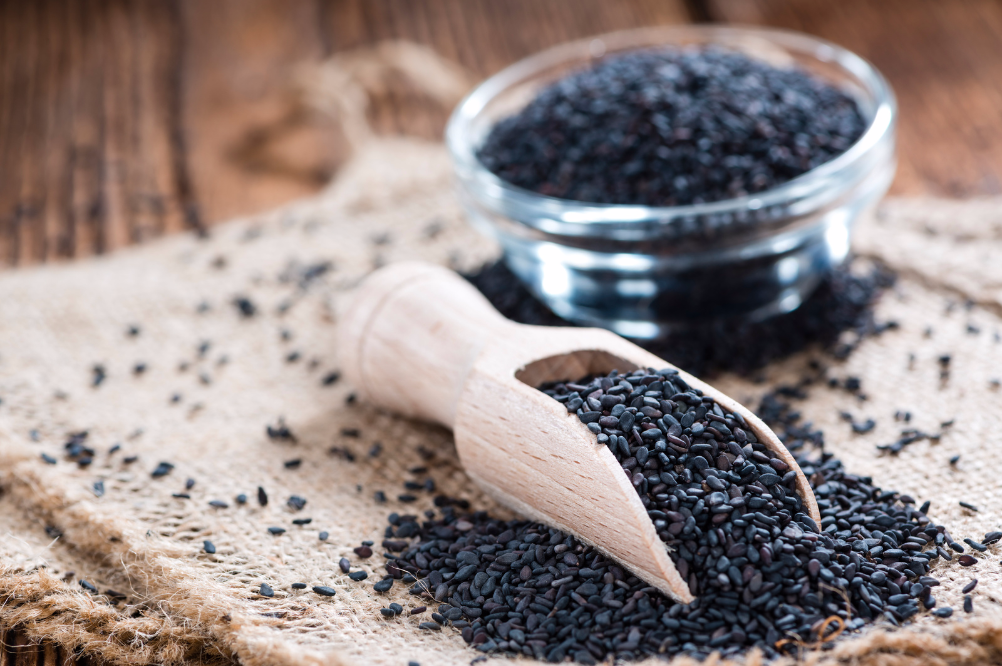


Assoc. Prof. Prachya Kongtawelert, Ph.D.
Thailand Excellence Center for Tissue Engineering and Stem Cells (ThaiTES)
Faculty of Medicine, Chiang Mai University
Sesame seed (Sesamumindicum L.) in family Pedaliaceae are used as a food for more than 4,000 years for cooking both of savory and sweet dishes. Sesame seed is one of the oldest oilseed and economic crops known. Thailand has grown many sesame species by the three types of seeds: Black sesame, White sesame and Black-Red sesame. Major grown in the northern and north-eastern region around 381,000 rais of production (Total product harvested about 35,000 tons)
The previous study found that sesame is a high nutritional seeds and have health benefit. The contents of sesame seedsareabout 35-37% oil and 17-25% protein. Interestingly, the protein contents in sesame are different from other legumes and oilseed plants by the essential amino acid such as the high content of methionine and cysteine but lysine content is too small. Thus, there are suitable for vegetarian diet with other legumes (low level of methionine and cysteine but high level of lysine content). Sesame oil contains good fatty acid including of 85% unsaturated fatty acid such as omega-3 and omega-6 that can reduce blood cholesterol and prevent the coronary heart disease.Additionally,they have linoleic, the fatty acid that improve healthy skin and hair.
Minerals in sesame oil have health benefits for human such as Calcium, Phosphorus, Potassium, Copper and Manganese. Vitamin B helps improve the nervous system. In addition, sesames havevitamin E and the lignin compound in sesame oil such as sesamin,sesamol, sesaminol, sesamilinol and pinoresinol.
Observations by the researchers found the widely used of sesame or sesame oil for diseases therapy or reduced symptom of some diseases in previous. When take regularly, sesame seed may help improve overall wellness, such asberiberi prevention, bone maintenance, reduce constipation and reduce in blood cholesterol level.
Additionally, the raw sesame oil can be used in massage therapy which may help improve the nervous system and balance the hormone level for relaxation, stress reduction.
Nowadays, the pharmacology of this plant and its active ingredients are being studiedby numerous researchers worldwide. They found various health benefit of sesamin such as:
1. Free radical reactionsand oxidative stress that subsequently damage to cells and tissues result to induce aging and decrease lifespan. Sesames are helpful in reducing and preventing such damage by its various antioxidants in seed including of Vitamin E and Lignin compound in sesame oil such as sesamin,sesamol, sesaminol, sesamilinol and pinoresinol. Global research found important lignin compound in seed, play a various roles in human cellular for health benefit.
2. Anti-inflammation properties by inhibition delta-5-desaturase enzyme in pathway of inflammatory response. Pure extract of sesamin can reduce Interleukin-1 Beta andTumor Necrosis Factor-Alpha synthesis. Recent studies show results of the activated white blood cells (Peripheral Mononuclear Cells (PBMC)) with H1N1 virus are the increasedrelease inpro-inflammatory cytokines and induce the inflammatory response. In case of sesamin treatment, they found acleardecrease in a quantity of a pro-inflammatory cytokine such as the IL-1 Beta synthesis as well.
3. Pure extract of sesamin are preventing theOsteoarthritisby inhibiting mode of action of Interleukin-1 Beta that play a significantly role in inflammatory response and cartilage degradation.The chondroprotective effects of sesamin were thus studied in a porcine cartilage explant induced with interleukin-1beta. This induction was significantly inhibited by sesamindue to its ability to decrease expression of MMP-13 which can degrade biomolecule in the cartilage such as collagen. These results demonstrate that sesamin efficiently suppressed the pathological processes in Osteoarthritis.
4. Involve in the fatty acid metabolism by the beta – oxidation.
5. Enhancer activity of VitaminE and maintain blood VitaminE level. Induce some cancer cells into apoptosis process or biochemistry process for cell death.
6. Reducing cholesterol synthesis and absorption.
7. Promote interleukin-2 (IL-2) andinterferon – gamma (IFN-Gamma) synthesis in white blood cells and modulate immune response in the body.
8. Help maintain blood lipid level.
9. Inhibiting angiogenesis pathway of some cancer cells.
Summary
Sesamin is a natural lignancompound found in sesame seeds.Numerous scientific findings from Globaland Thailandresearchers have shown that there are many health benefits from sesamin. Such benefit includes;antioxidant properties, anti-inflammation properties, prevent osteoarthritis disease, enhancer activity of VitaminE and maintain blood Vitamin E level, reduce cholesterol synthesis and absorption and modulate immune response in the body. Thus, Food products which contain sesame seeds may help you maintain and promote a healthier body.
References
1. Chavali S.R., Zhong W.W. andForse R.A. Dietary alpha-linolenic acid increases TNF-alpha, and decreases IL-6, IL-10 in response to LPS: effects of sesamin on the delta-5 desaturation of omega6 and omega3 fatty acids in mice. Prostaglandins LeukotEssent Fatty Acids.1998; 58:185-91.
2. Wu J.H., Hodgson J.M., Clarke M.W., Indrawan A.P., Barden A.E., Puddey I.B. and Croft K.D. Inhibition of 20-hydroxyeicosatetraenoic acid synthesis using specific plant lignans: In vitro and human studies. Hypertension.2009; 54, 1151–1158.
3. Wu J.H., Hodgson J.M., Puddey I.B., Belski R., Burke V. and Croft K.D. Sesame supplementation does not improve cardiovascular disease risk markers inoverweight men and women. Nutr.Metab.Cardiovasc. Dis. 2009; 19, 774–780.
4. Phitak T., Pothacharoen P., Settakorn J., Poompimol W., Caterson B. andKongtawelert P. Chondroprotective and anti-inflammatory effects of sesamin. Phytochemistry.2012; 80:77-88.
5. Chakraborthy G.S., Sharma G. and Kaushik K.N. Sesamumindicum: a review. Journal of Herbal Medicine and Toxicology.2008; 2 (2), 15-19.
6. Wichitsranoi J., Weerapreeyakul N., Boonsiri P., Settasatian C., Settasatian N., Komanasin N., Sirijaichingkul S., Teerajetgul Y., Rangkadilok N. andLeelayuwat N. Antihypertensive and antioxidant effects of dietary black sesame meal in pre-hypertensive humans. Nutr J. 2011; Aug 9.
7. Wu X.Q., Kong X., Zhou Y., Huang K., Yang J.R. and Li X.L. Sesamin exerts renoprotective effects by enhancing NO bioactivity in renovascular hypertensive rats fed with high-fat-sucrose diet. Eur J Pharmacol. 2012; May 15;683(1-3).
8.Kongtawelert P. Phytochemical compositions including sesamin for anti-inflammatory, anti-cytokine storm, and other uses. Unites states patent application publication. 2012.